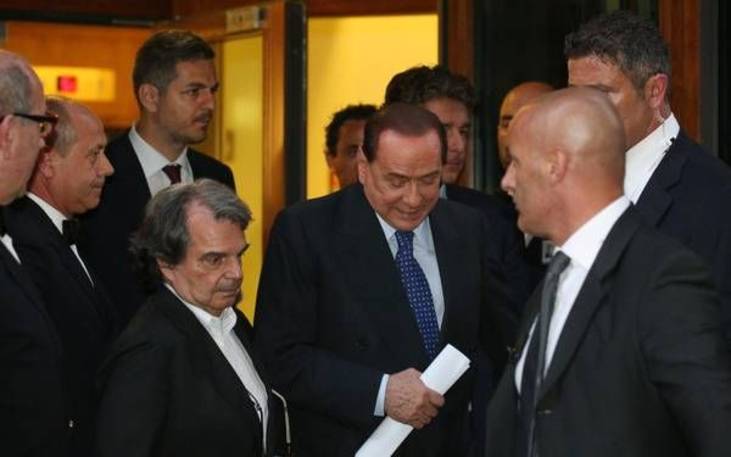ROME- And what now? Sentenced to four years, Silvio Berlusconi has the benefit of three years' pardon, leaving a one year sentence. Because he is over 70, the former premier will not actually go to prison during that year, but will be asked if he prefers to live under house arrest or to turn himself over to social workers for re-education. His passport will be confiscated, and for the coming six years he cannot run for public office. A crucial question is whether or not he will be forced to resign from his Senate seat or choose to resign beforehand. Either way, as Berlusconi himself said, in an emotional TV monologue just hours after his conviction of fiscal fraud Thursday, the judges "have come down on me without precedent. But I am staying on the playing field."
The most salient comments on Silvio Berlusconi's criminal conviction and sentencing Thursday by Italy's high court of Cassations - his first conviction in some 40 cases - came today from two editors-in-chief of influential dailies. These are not the aging, carefully coifed women who have been waving "I love Silvio" placards in front of the Milan courthouse, nor are they the trade unionists in Rome's Piazza San Giovanni vowing eternal enmity against the bourgeoisie. One stands out among Berlusconi's staunchest supporters, the other as one of his most determined adversaries. Their diametrically opposed points of view help to explain some of the passions the conviction has unleashed in the rival camps.
Alessandro Sallusti, who happens to be the partner of the glamorous Berlusconi pasionaria Daniela Santanche', has directed the rightwing Il Giornale, founded by the legendary Indro Montanelli in 1987, for the past three years. Ezio Mauro, former editor-in-chief of La Stampa of Turin, has been chief editor of the left-leaning La Repubblica since 1996. For Sallusti, in a banner headline today, "Berlusconi isn't finished" even though Italy is being devoured by a cancer misnamed "justice." Whereas Berlusconi has just been convicted as a hardened tax cheat, Sallusti argues that the former premier in fact had no control over the Mediaset company at the time when the supposed crime took place, "as has already been shown in the two previous [court] sentences." Bad will and cheating are involved in all this - "that same cheating which persuaded Berlusconi to be led by the hand onto the scaffolding and then pushed down."
Sallusti also took issue with the head of the left-leaning Partito Democratico (PD), former trade union leader Guglielmo Epifani, who declared that the court sentence would be executed as soon as possible. For Sallusti, Epifani is behaving as if he were the "sheriff." Indeed, even as the PD premier Enrico Letta is fighting to keep the Berlusconi conviction from bringing down the government, PD hard-liners are insisting that the PD resign from its alliance with the Liberty party (PdL), on grounds that its leader is formally acknowledged to be a convicted criminal. To this end the daily Il Fatto Quotidiano is collecting signatures for a petition to force the PD out of the government.
However, those who are more concerned for economic stability than for ideological purity, and who resist the notion of new elections less than six months after the last round, are working to keep the Letta government intact, including in partnership with the Berlusconi party. For his part, Berlusconi, ignoring the hawks in his party, has done nothing to bring down the government - on the contrary, he seems to fear that the PdL's storming out would throw votes to the left. At best, lacking the promised, but never delivered, revised electoral law to replace the scorned "Porcellum," results would likely be the same, and equally inconclusive.
Sallusti's conclusion is that "Berlusconi's political adventure does not end here, and no one should be so deluded as to think he can divvy up the booty. If the PD finds being in the government with the PdL is just too disgusting, they should know that the feeling is mutual." As Sallusti goes on to say, the story of Forza Italia, the personal party which Berlusconi plans to relaunch to replace the PdL, does not emerge from the old Communism of millions of dead people and economic recipes that have left countless people starving.
Ezio Mauro's point of view is more succinct. He argues that, in the ongoing debate, Berlusconi is the subject, not what he did to merit conviction; politics has trumped the precise facts of the case, confirmed and reconfirmed in the three degrees of trial. In Mauro's words the facts are that: "At least E270 million were subtracted from Mediaset and its shareholders: the film rights which were purchased at 100 and resold to Mediaset for 1,000, so as to construct, in the intermediate passages, an illicit stash of slush funds in Switzerland, Montecarlo and the Bahamas, made fully and illegally available to the Cavaliere [Berlusconi]."
The point was to dodge taxes by showing that costs were higher than in reality. This was done, said the court, by selling and reselling, again and again, the same film rights. This trial is anything but about politics, therefore, Mauro concludes, and the conviction demonstrates that in Italy all citizens are equal before the law, as the banner in every courtroom declares.


